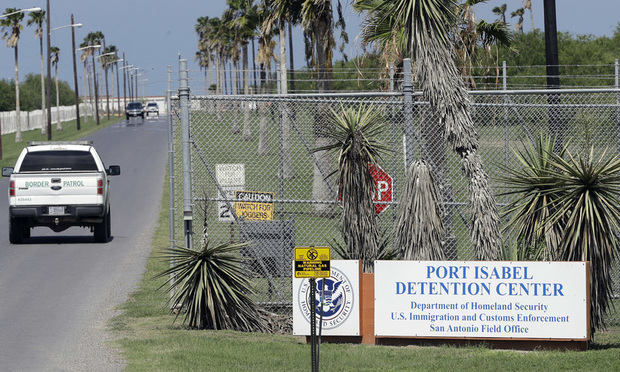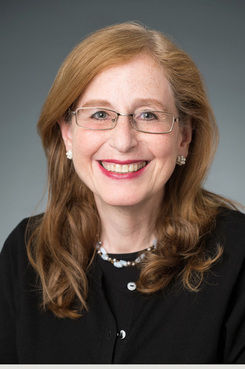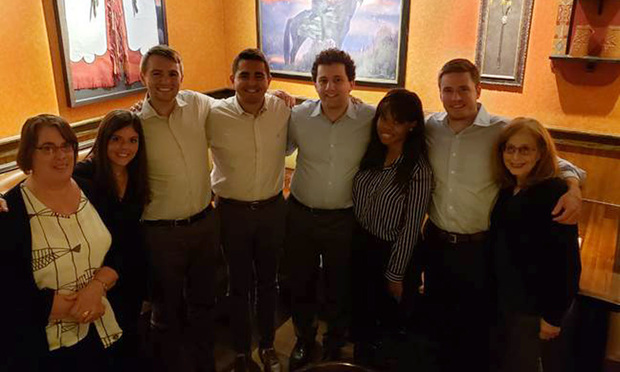Fried Frank Sends Lawyers to Texas To Offer Pro Bono Immigration Representation
"It's very important to give voice to people who don't have a voice within our system. It's very important for lawyers to stand up to ensure that, whatever we're doing, we are complying with our laws," said Gail Weinstein.
July 16, 2019 at 11:30 AM
4 minute read
The original version of this story was published on Texas Lawyer
 A U.S. Border Patrol truck enters the Port Isabel Detention Center near Los Fresnos, Texas,, which holds detainees of the U.S. Immigration and Customs Enforcement, on June 26, 2018. Photo: David J. Phillip/AP
A U.S. Border Patrol truck enters the Port Isabel Detention Center near Los Fresnos, Texas,, which holds detainees of the U.S. Immigration and Customs Enforcement, on June 26, 2018. Photo: David J. Phillip/AP
A group of Big Law attorneys are back in New York and Washington, D.C., after a weeklong trip to Texas to represent men in asylum cases in an immigration detention center.
The eight lawyers from Fried, Frank, Harris, Shriver & Jacobson were volunteering with the American Bar Association's Harlingen-based South Texas Pro Bono Asylum Representation Project, or ProBAR, to represent clients in the Port Isabel Service Processing Center near Los Fresnos. A group of more than 80 lawyers and support staff assisted their efforts remotely from the firm's offices in New York, Washington, D.C., and London.
Texas Lawyer spoke with Fried Frank senior counsel Gail Weinstein, who coordinated the pro bono effort, about the lawyers' work, results and the toll it took. Here are here answers, edited for brevity and clarity.
 Gail Weinstein, senior counsel, Fried, Frank, Harris, Shriver & Jacobson, New York.
Gail Weinstein, senior counsel, Fried, Frank, Harris, Shriver & Jacobson, New York.How many clients did you help in the Port Isabel detention facility?
I think we saw about 15 clients. We helped all of them by talking to them and listening to them and being nice to them. That alone was a really positive part of what we were doing. It's very hard to obtain any kind of victories, whether getting released from the detention center or prevailing on the ultimate asylum case. It really was meaningful to people that there were people trying to help them, and their chances were being raised above zero by having legal representation.
There is one person who has been released because of our efforts—we were incredibly gratified about it—a 21 year old man.
What was your daily schedule like?
We went to the detention center every day and spent most of the day at the detention center. We spoke with each of our clients every day. Most days we heard about a situation that we added to our list because it was such a compelling situation. We wanted to see if we could do something about it. At the end of the day, we would leave and get something to eat, and work through the evening.
One evening, we didn't work and crossed an official port of entry in Brownsville and went to the other side in Mexico, where there is an encampment of 150 to 250 people sitting on the ground waiting because of the current metering situation, where only a few people can cross the border. … The people we talked to had been there waiting many months already. There were few shelters there—mostly, people just wait on the streets. We brought dinner for those people and brought some supplies and food, and just talked to them and answered legal questions.
How did you feel about what you saw there?
I felt that it's very important to give voice to people who don't have a voice within our system. It's very important for lawyers to stand up to ensure that, whatever we're doing, we are complying with our laws.
 From left to right: Karen Grisez (public service counsel), Fabiola Villamil (summer associate), Trent Pacer (summer associate), Rodolfo Martinez-Don (summer associate), Daniel Carlen (summer associate), Priscilla Hamilton (summer associate), Robert Engelke (associate) and Gail Weinstein (senior counsel).
From left to right: Karen Grisez (public service counsel), Fabiola Villamil (summer associate), Trent Pacer (summer associate), Rodolfo Martinez-Don (summer associate), Daniel Carlen (summer associate), Priscilla Hamilton (summer associate), Robert Engelke (associate) and Gail Weinstein (senior counsel).What was the emotional impact from this trip on you and your lawyers?
It's a really difficult emotional thing to hear the stories of what happened to these people in their home countries.Then they have the journey to the United States, which is beyond words in terms of its difficulties and the horrendous things that happen to people on the journey. Then what happens to people here in detention, and some of the conditions they face and difficult legal situations they are in after all that. These are not people who appeared to be criminals or hardened men or dangerous and scary. Just the opposite:. Every one of them was the most lovely person you've ever met. Many of them were so young: 16, 17, 18 years old, in this adult facility. They are all grateful and soft-spoken. It is an emotionally grueling experience. But you think of how grueling the experience is for them, and you carry on.
This content has been archived. It is available through our partners, LexisNexis® and Bloomberg Law.
To view this content, please continue to their sites.
Not a Lexis Subscriber?
Subscribe Now
Not a Bloomberg Law Subscriber?
Subscribe Now
NOT FOR REPRINT
© 2025 ALM Global, LLC, All Rights Reserved. Request academic re-use from www.copyright.com. All other uses, submit a request to [email protected]. For more information visit Asset & Logo Licensing.
You Might Like
View All

How Some Elite Law Firms Are Growing Equity Partner Ranks Faster Than Others
4 minute read
Law Firms Expand Scope of Immigration Expertise Amid Blitz of Trump Orders
6 minute readTrending Stories
- 1Thursday Newspaper
- 2Public Notices/Calendars
- 3Judicial Ethics Opinion 24-117
- 4Rejuvenation of a Sharp Employer Non-Compete Tool: Delaware Supreme Court Reinvigorates the Employee Choice Doctrine
- 5Mastering Litigation in New York’s Commercial Division Part V, Leave It to the Experts: Expert Discovery in the New York Commercial Division
Who Got The Work
J. Brugh Lower of Gibbons has entered an appearance for industrial equipment supplier Devco Corporation in a pending trademark infringement lawsuit. The suit, accusing the defendant of selling knock-off Graco products, was filed Dec. 18 in New Jersey District Court by Rivkin Radler on behalf of Graco Inc. and Graco Minnesota. The case, assigned to U.S. District Judge Zahid N. Quraishi, is 3:24-cv-11294, Graco Inc. et al v. Devco Corporation.
Who Got The Work
Rebecca Maller-Stein and Kent A. Yalowitz of Arnold & Porter Kaye Scholer have entered their appearances for Hanaco Venture Capital and its executives, Lior Prosor and David Frankel, in a pending securities lawsuit. The action, filed on Dec. 24 in New York Southern District Court by Zell, Aron & Co. on behalf of Goldeneye Advisors, accuses the defendants of negligently and fraudulently managing the plaintiff's $1 million investment. The case, assigned to U.S. District Judge Vernon S. Broderick, is 1:24-cv-09918, Goldeneye Advisors, LLC v. Hanaco Venture Capital, Ltd. et al.
Who Got The Work
Attorneys from A&O Shearman has stepped in as defense counsel for Toronto-Dominion Bank and other defendants in a pending securities class action. The suit, filed Dec. 11 in New York Southern District Court by Bleichmar Fonti & Auld, accuses the defendants of concealing the bank's 'pervasive' deficiencies in regards to its compliance with the Bank Secrecy Act and the quality of its anti-money laundering controls. The case, assigned to U.S. District Judge Arun Subramanian, is 1:24-cv-09445, Gonzalez v. The Toronto-Dominion Bank et al.
Who Got The Work
Crown Castle International, a Pennsylvania company providing shared communications infrastructure, has turned to Luke D. Wolf of Gordon Rees Scully Mansukhani to fend off a pending breach-of-contract lawsuit. The court action, filed Nov. 25 in Michigan Eastern District Court by Hooper Hathaway PC on behalf of The Town Residences LLC, accuses Crown Castle of failing to transfer approximately $30,000 in utility payments from T-Mobile in breach of a roof-top lease and assignment agreement. The case, assigned to U.S. District Judge Susan K. Declercq, is 2:24-cv-13131, The Town Residences LLC v. T-Mobile US, Inc. et al.
Who Got The Work
Wilfred P. Coronato and Daniel M. Schwartz of McCarter & English have stepped in as defense counsel to Electrolux Home Products Inc. in a pending product liability lawsuit. The court action, filed Nov. 26 in New York Eastern District Court by Poulos Lopiccolo PC and Nagel Rice LLP on behalf of David Stern, alleges that the defendant's refrigerators’ drawers and shelving repeatedly break and fall apart within months after purchase. The case, assigned to U.S. District Judge Joan M. Azrack, is 2:24-cv-08204, Stern v. Electrolux Home Products, Inc.
Featured Firms
Law Offices of Gary Martin Hays & Associates, P.C.
(470) 294-1674
Law Offices of Mark E. Salomone
(857) 444-6468
Smith & Hassler
(713) 739-1250







